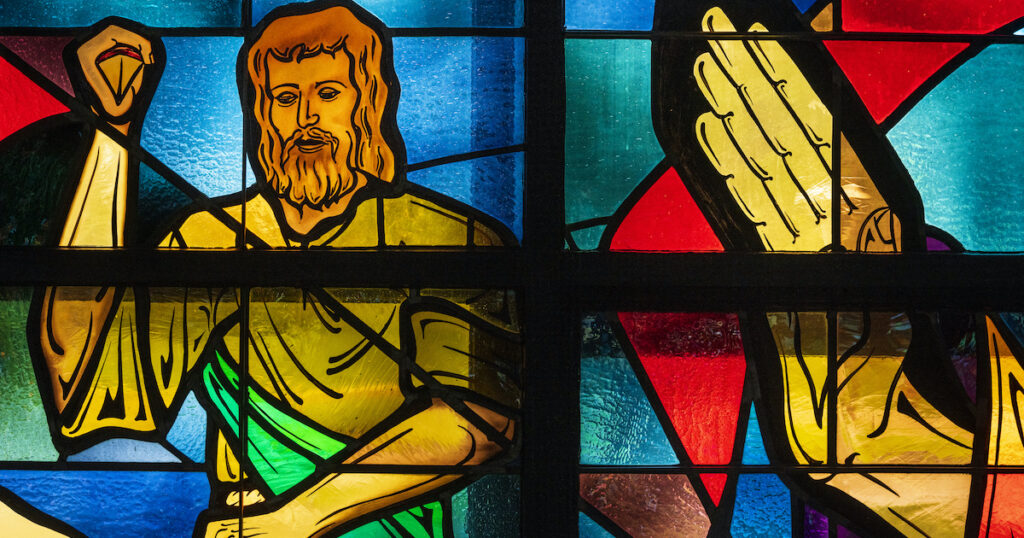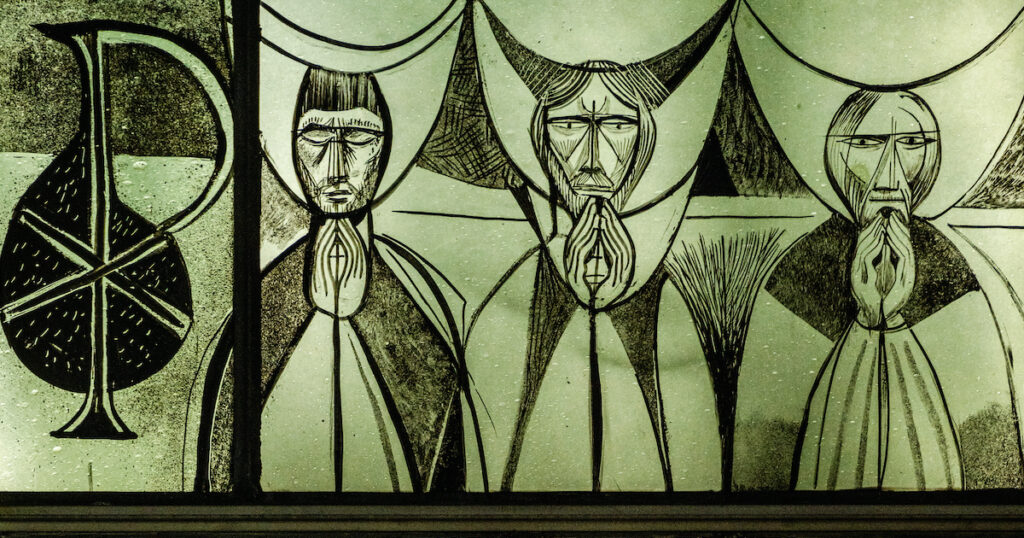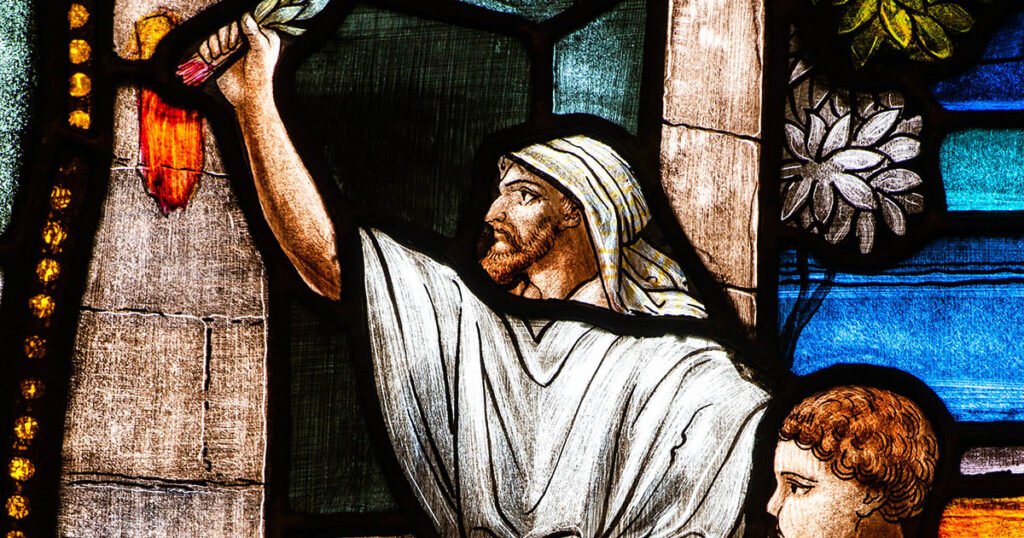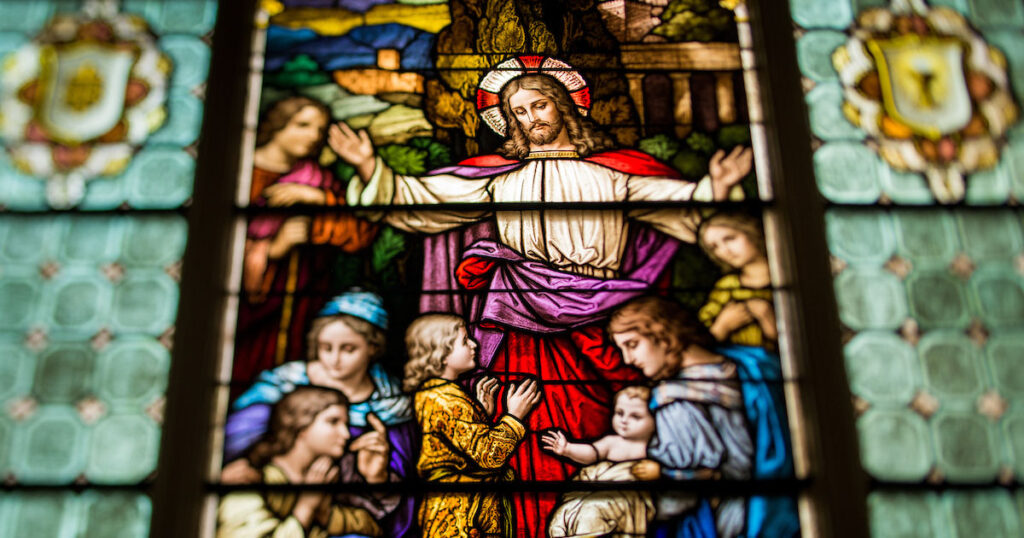After these things God tested Abraham and said to him, “Abraham!” And he said, “Here I am.” 2 He said, “Take your son, your only son Isaac, whom you love, and go to the land of Moriah, and offer him there as a burnt offering on one of the mountains of which I shall tell you.” 3 So Abraham rose early in the morning, saddled his donkey, and took two of his young men with him, and his son Isaac. And he cut the wood for the burnt offering and arose and went to the place of which God had told him. 4 On the third day Abraham lifted up his eyes and saw the place from afar. 5 Then Abraham said to his young men, “Stay here with the donkey; I and the boy will go over there and worship and come again to you.” 6 And Abraham took the wood of the burnt offering and laid it on Isaac his son. And he took in his hand the fire and the knife. So they went both of them together. 7 And Isaac said to his father Abraham, “My father!” And he said, “Here I am, my son.” He said, “Behold, the fire and the wood, but where is the lamb for a burnt offering?” 8 Abraham said, “God will provide for himself the lamb for a burnt offering, my son.”
Genesis 22:1–14
So they went both of them together.
9 When they came to the place of which God had told him, Abraham built the altar there and laid the wood in order and bound Isaac his son and laid him on the altar, on top of the wood. 10 Then Abraham reached out his hand and took the knife to slaughter his son. 11 But the angel of the Lord called to him from heaven and said, “Abraham, Abraham!” And he said, “Here I am.” 12 He said, “Do not lay your hand on the boy or do anything to him, for now I know that you fear God, seeing you have not withheld your son, your only son, from me.” 13 And Abraham lifted up his eyes and looked, and behold, behind him was a ram, caught in a thicket by his horns. And Abraham went and took the ram and offered it up as a burnt offering instead of his son. 14 So Abraham called the name of that place, “The Lord will provide”; as it is said to this day, “On the mount of the Lord it shall be provided.”
One thing that makes us nervous about early Christian interpretation of the Scriptures is what we call “allegory” or “spiritual exegesis.” And there’s no one more famous (infamous?) for this than Origen. An allegorical interpretation of Scripture often seeks a hidden meaning beyond the historical context.
Origen (c. a.d.185–254) was highly regarded as a teacher of the Scriptures and commented exhaustively upon them. He’s said to have lectured and preached the whole OT at great length. Sadly, much is lost due to his condemnation some 300 years after his death. Nevertheless, Origen’s allegorical method of interpretation prevails in his surviving commentaries, especially on Genesis. His work On First Principles lays out his ideas in depth. Emphasizing the inspiration of the Scriptures, he concludes that as the work of the Holy Spirit, Scripture should be approached spiritually. And yet, being written down for us, they also have a body. He says, “Just as man consists of body, soul and spirit, so in the same way does the scripture, which has been prepared by God to be given for man’s salvation” (4.11). Body refers to the historical/literal interpretation, which is open to everyone; soul attends to the moral/ethical, which requires something of us; and spirit pertains to the heavenly, which is alone for the Christian. For Origen, the way to the Spirit is always through the body, a fact often overlooked.
Now, despite the reticence of some toward allegory, which St. Jerome defines simply as “putting forward one thing in the words, but meaning another in the sense,”1 Origen makes use of this spiritual reading above all for the sake of revealing Christ. What we’ll see below in his interpretation of the sacrifice of Isaac (Gen. 22) is a profound preaching of Christ the crucified. Here’s Origen:
Abraham took wood for the burnt offering and placed it upon Isaac his son, and he took fire and a sword in his hands, and together they went off. Isaac himself carries the wood for his own holocaust: this is a figure of Christ. For he bore the burden of the cross, and yet to carry the wood for the holocaust is really the duty of the priest. He is then both victim and priest. This is the meaning of the expression: together they went off. For when Abraham, who was to perform the sacrifice, carried the fire and the knife, Isaac did not walk behind him, but with him. In this way he showed that he exercised the priesthood equally with Abraham.
What happens after this? Isaac said to Abraham his father: Father. This plea from the son was at that instant the voice of temptation. For do you not think the voice of the son who was about to be sacrificed struck a responsive chord in the heart of the father? Although Abraham did not waver because of his faith, he responded with a voice full of affection and asked: What is it, my son? Isaac answered him: Here are the fire and the wood, but where is the sheep for the holocaust? And Abraham replied: God will provide for himself a sheep for the holocaust, my son.
The careful yet loving response of Abraham moves me greatly. I do not know what he saw in spirit, because he did not speak of the present but of the future: God will provide for himself a sheep. His reply concerns the future, yet his son inquires about the present. Indeed the Lord himself provided a sheep for himself in Christ.
Abraham extended his hand to take the sword and slay his son, and the angel of the Lord called to him from heaven and said: Abraham, Abraham. And he responded: Here I am. And the angel said: Do not put your hand upon the boy or do anything to him, for now I know that you fear God. Compare these words to those of the Apostle when he speaks of God: He did not spare his own Son but gave him up for us all [Rom 8:32]. God emulates man with magnificent generosity. Abraham offered to God his mortal son who did not die, and God gave up his immortal Son who died for all of us.
And Abraham, looking about him, saw a ram caught by the horns in a bush. We said before that Isaac is a type of Christ. Yet this also seems true of the ram. To understand how both are figures of Christ–Isaac who was not slain and the ram who was–is well worth our inquiry.
Christ is the Word of God, but the Word became flesh. Christ therefore suffered and died, but in the flesh. In this respect, the ram is the type, just as John said: Behold the lamb of God, behold him who takes away the sins of the world. The Word, however, remained incorruptible. This is Christ according to the spirit, and Isaac is the type. Therefore, Christ himself is both victim and priest according to the spirit. For he offers the victim to the Father according to the flesh, and he is himself offered on the altar of the cross.
This excerpt from a homily on Genesis 22 (Hom. 8,6 8. 9: PG 12, 206-209). https://www.crossroadsinitiative.com/media/articles/abrahams-sacrifice-of-isaac-origen/
First, we need to make sense of a few of Origen’s words. He says that Isaac is carrying his own wood for a holocaust. For us, that word has a very definite meaning; and, of course, Origen wasn’t aware of Nazi Germany. He spoke Greek. When the Hebrew Old Testament was translated into Greek, “burnt offering” (‘Olah) was typically translated “Holocaust.”
Secondly, Origen speaks of both “figure” and “type,” which he uses interchangeably. Later on, these terms will be more fully developed. But for now, Origen means that in Isaac and the ram we see Christ. To be a “type” means that they bear the imprint of Christ. Think of a typewriter. The letter literally imprints itself onto the page. That’s how it is with Christ, who imprints or types Himself into the events and people — even the places and institutions — of the Old Testament in such a way that gives Himself to be seen and known through them. The Old Testament isn’t just history nor just pointing forward to Christ, but mysteriously delivers Christ to His people of old.
Also notice how Origen dabbles in some fairly serious Christology while sorting through the two types. Isaac is a type in the way that he carries his own wood (just as Jesus to Golgotha), as he walks alongside of Abraham (demonstrating Jesus’ unity with the Father), and willingly and innocently gives himself for the sacrifice. Nevertheless, Isaac doesn’t die. As Origen points out, that’s akin to the Divine Nature of the Son, which in itself doesn’t die. But the ram, which is sacrificed, accords with the human nature. Together, these two types prefigure Jesus who brings the flesh and the spirit together and truly dies for His people. This leads Origen to the classically patristic and beautiful paradox: “Abraham offered to God his mortal son who did not die, and God gave up his immortal Son who died for all of us.”
Reading this story with Origen gives us a far more robust view of Christ in the story. We are given to reflect on Christ as both victim and priest, Isaac and the ram. In so doing, we rejoice in the faith of Abraham and the gift of our Lord.






Origen seems to me one of the most wobbly church fathers, sometimes producing great insight and sometimes getting out into the weeds pretty deeply. Followers of his seem to have believed that the Father had an anthropomorphic body, and that the souls of humans existed before creation (both sounding weirdly Mormon actually), but he’s also sometimes really insightful.
The thing in this article that strikes me is the assertion that Christ died according to the flesh. I’m pretty sure that He died completely for us. God cannot die, and yet on the cross God died. If only a man died on the cross, we are not saved. If a man did not die on the cross, we are not saved. I’d have expected a little commentary on that particular point in Origen’s wobbly work, as it seems very instructive floor Christology today: don’t divide the person of Christ.
Very good study of the sacrifice of Isaac. I was unaware of Origen until reading this article. It is so meaningful to learn about the parallels with Jesus in this historic event, and the beautifully profound conclusion. Oh, the richness and depth of God and and His love for us.